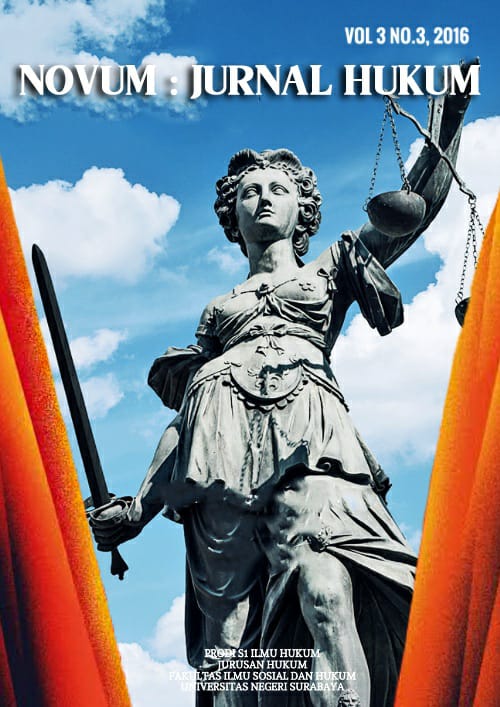ANALISIS YURIDIS PUTUSAN MAHKAMAH KONSTITUSI NOMOR 21/PUU-XII/2014 DALAM MENGUJI PASAL 77 HURUF A KITAB UNDANG-UNDANG HUKUM ACARA PIDANA TERKAIT FUNGSI MAHKAMAH KONSTITUSI SEBAGAI POSITIVE LEGISLATOR
DOI:
https://doi.org/10.2674/novum.v3i3.17860Abstract
Abstrak
Mahkamah Konstitusi dalam menguji undang-undang terhadap UUD NRI 1945 berfungsi sebagai pembatal norma (negative legislator), dan dilarang membuat rumusan norma baru atas norma yang dibatalkan atau membuat putusan yang bersifat positive legislator. Tetapi, dalam Putusan Nomor 21/PUU-XII/2014 MK telah berfungsi sebagai positive legislator. Tujuan penelitian ini adalah Untuk menganalisis dasar pertimbangan Hakim MK dalam membuat norma baru dalam Putusan MK Nomor 21/PUU- XII/2014 atas Perkara Pengujian Pasal 77 huruf a KUHAP terkait dengan fungsi MK sebagai positive legislator dan untuk menganalisis implikasi hukum dari pemuatan norma baru oleh MK dalam putusan tersebut. Penelitian ini merupakan penelitian hukum normatif, dengan menggunakan pendekatan perundang-undangan, pendekatan kasus, dan pendekatan konseptual. Sumber bahan hukum yang digunakan berupa bahan hukum primer, sekunder, dan tersier. Berdasarkan hasil penelitian dan pembahasan dapat disimpulkan bahwa fungsi MK sebagai positive legislator dalam Putusan Nomor 21/PUU-XII/2014 mengenai pengujian Pasal 77 huruf a KUHAP adalah kurang tepat, karena hak-hak tersangka atas penetapan dirinya sebagai tersangka, penggeledahan, dan penyitaan yang tidak dilakukan sesuai dengan prosedur hukum acara sudah diatur dalam KUHAP, sehingga tidak terjadi kekosongan hukum. Selain itu, MK juga tidak mempertimbangkan tentang adanya kondisi mendesak dalam putusan tersebut. Dan putusan tersebut juga menimbulkan beberapa implikasi, yaitu; pertama, banyak tersangka yang mengajukan permohonan praperadilan, kedua, menimbulkan pasal-pasal dalam KUHAP yang terkait praperadilan harus dimaknai termasuk penetapan tersangka, penggeledahan dan penyitaan, selain itu, putusan MK tersebut juga menjadikan Pasal 40 UU KPK yang melarang KPK menerbitkan Surat Perintah Penghentian Penyidikan dan Penuntutan menjadi tidak dapat dijalankan, ketiga, putusan tersebut bisa menjadi yurisprudensi, keempat, putusan tersebut menimbulkan permohonan praperadilan atas kasus yang sama dapat diajukan berulang kali, karena dalam KUHAP tidak diatur batasan tentang berapa kali praperadilan dapat diajukan.
Kata Kunci: Mahkamah Konstitusi, Positive Legislator, Praperadilan
2
Abstract
The Constitutional Court in judicial review of regulation against the UUD NRI 1945 serves as canceling the norm (negative legislator), and is prohibited from making the formulation of a new norm of norms that were canceled or or the make decisions that are positive legislator. However, in Decision No. 21 / PUU-XII / 2014 the Court has been functioning as a positive legislator. The purpose of this study is to analyze the basic consideration of the Court Judge in making new norms in the Constitutional Court Decision No. 21 / PUU XII / 2014 on judicial review of Article 77 letter a Criminal Code related to with the function of the Court as a positive legislator and to analyze the legal implications of the contains of the new norms by the Constitutional Court in the decision. This study is normative, using the approach of legislation, case approach, and conceptual approaches. Sources of legal materials which used are the primary legal materials, secondary, and tertiary. According to results and discussion of the study can be result, if function of Constitutional Court as positive legislator at Constitutional Court Decision No. 21/PUU XII/2014 on judicial review of Article 77 letter a Criminal Code was not correctly right. Because the suspect’s rights as determination of suspect, search and seizure which was not done in accordance with legal procedures that have been set in criminal code laws so there is no legal vacuum. Besides constitutional court also did not considers the existence of urgent situations in the decision. And the decision also raises some implications, first many suspects who applied for pretrial court, second give rise to the criminal code laws relating pretrial courd should be interpreted, including determination of suspect, search and seizure, besides constitutional court decision also makes the article 40 of law prohibits anti-corruption commission issuing a warrant termination of the investigation and prosecution be executed, third, the decision can be a yurisprudence, fourth the decision raises pretrial court petition in the same case can be filed repeatedly for in the criminal code laws does not set limits on how many times a pretrial court may be filed.
Keyword: Constitutional Court, Positive Legislators, Pretrial Court
Downloads
 Abstract views: 179
,
Abstract views: 179
, PDF Downloads: 1181
PDF Downloads: 1181



